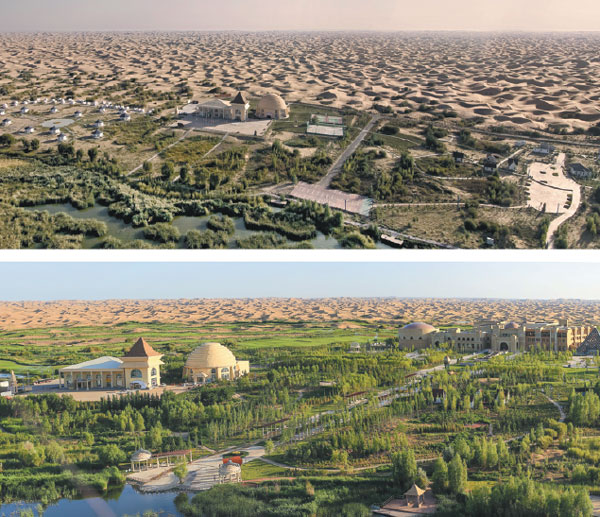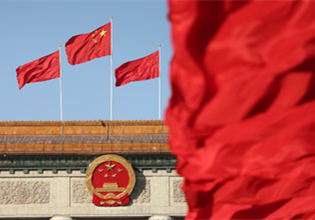Elion's 'desertification' plan gains international acclaim
|
The Kubuqi Desert ecosystem restoration project, which relies on advanced sand control technologies in the Inner Mongolia autonomous region, has developed at an incredible rate. The pictures show the same area of the Kubuqi Desert in 2007 and 2013, respectively. Provided to China Daily |
Groundbreaking environmental projects, carried out over many years in the Kubuqi Desert in the Inner Mongolia autonomous region, are to be used as blueprints to further improve conditions in other harsh areas of western China.
Completed by Elion Resources Group Co, a leading Chinese expert in the development of desert economies, green living, clean energy and cultural tourism, the work has just been showcased at the World Climate Change Conference 2015, being held in Le Bourget, near Paris.
Elion officials told the conference that the company had effectively greened 12,700 square kilometers of desert over a 27-year period, which in turn directly benefitted the lives of around 100,000 people, as well as creating jobs for more than 1 million across the country.
Wang Wenbiao, Elion's president, said such efforts at what he called desertification are urgently needed in other areas of China and elsewhere in the world, to combat the effects of climate change.
He told the Paris conference that arid desert areas now account for a quarter of the planet's land surface, and are having a serious effect on the climate.
"Dealing with desertification is as critical as cutting greenhouse gases for stopping climate change," said Wang.
"Our successful models have helped promote best practices for ecological restoration, and we are keen these are now shared with other developing countries that are struggling with encroaching sands."
More than 6,000 sq km, or one-third of the entire Kubuqi Desert, is now "green again" thanks to the joint efforts of Elion Resources and the local government, said Wang, with many millions of plants planted over the past three decades.
According to the Desertification Control Bureau under China's State Forestry Administration, China is facing severe soil depletion in many areas.
A total 1.73 million sq km of soil has been lost to desertification over the past 50 years, accounting for 18 percent of the country's total land area and directly affecting one-third of all residents - about 400 million people, according to the administration.
Supported by the World Bank, local officials and Elion Resources have worked together to create the Kubuqi Action Plan of Global Desertification Control (2015-25), which is aimed at further improving the entire region's ecosystem.
Within the plan, various desertification methods created and adopted by Elion Resources in the Kubuqi Desert have now been listed as effective global examples.
The methods highlighted have also been given support by the United Nations convention, particularly in its plans to develop projects in countries along the Silk Road Economic Belt.
"It will promote a public-private partnership to encourage the participation of enterprises and individuals. Elion Resources will finance the planting of another 130 million trees along the Belt and Road in the next three to five years," said Wang.
Deng Huafeng, a professor at the Beijing Forestry University, said some 110 countries are affected by desertification, which costs up to $50 billion annually. The damage in turn affects the livelihoods of around 1 billion impoverished people, said Deng.
zhongnan@chinadaily.com.cn



 Print
Print Mail
Mail






